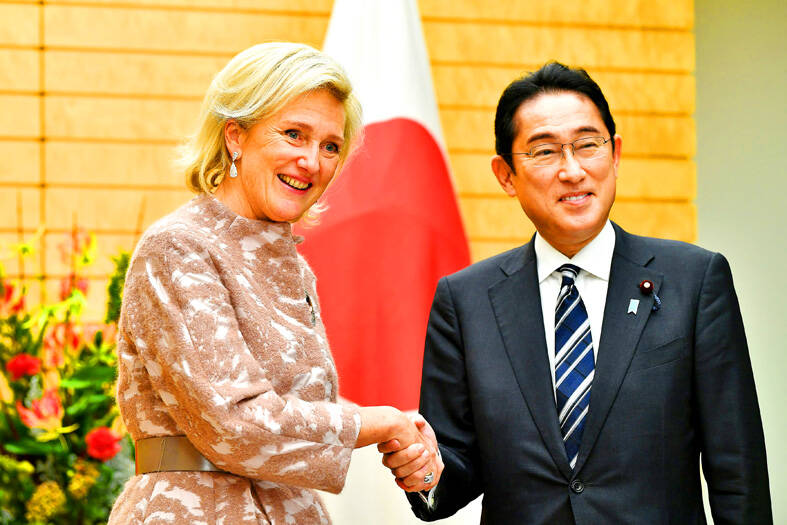Japanese Prime Minister Fumio Kishida has ordered a sharp defense spending hike that could see his long-pacifist nation’s defense budget balloon to near the levels spent by Russia.
Kishida instructed ministers to put together a budget of about ¥43 trillion (US$315 billion) for the five-year period starting in April next year, Japanese Minister of Defense Yasukazu Hamada said on Monday.
That is up 57 percent on the ¥27 trillion initially budgeted for the current five-year period.

Photo: Reuters
The change of direction for Japan, which has retained a US-drafted pacifist constitution since its defeat in World War II, comes after the nation was shocked by Russia’s invasion of Ukraine.
China’s threats toward Taiwan and North Korea’s nuclear ambitions have also lent support for Tokyo to embark on one of its largest military buildups in decades.
A poll conducted by the Yomiuri Shimbun over the weekend found that 51 percent of respondents approved of a hike to more than ¥40 trillion, while 42 percent disapproved.
The money is set to be used for items such as stockpiling missiles that are capable of striking military assets in neighbors Russia, China and North Korea.
Another goal over the next 10 years would be to triple the number of military units equipped with ballistic missile interceptors in a southwestern island chain that stretches toward Taiwan, Kyodo News reported, citing a draft of a government document.
The news met with criticism from China.
“Japan has been sensationalizing regional tensions in an attempt to seek a military breakthrough,” Chinese Ministry of Foreign Affairs spokeswoman Mao Ning (毛寧) said at a regular news conference in Beijing yesterday. “This is highly dangerous. It cannot but put Asian neighbors and the international community on high alert about Japan’s commitment to an exclusively defensive policy and to peaceful development.”
Kishida’s increase could mean Japan leapfrogs nations such as Saudi Arabia and France to become the world’s fifth-largest defense spender and reach annual spending about level with Russia, based on data provided by the Stockholm International Peace Research Institute.
However, the slump in the value of the yen against the US dollar would mean the cash might not go as far as in the past.
Ministries and ruling Liberal Democratic Party politicians have wrangled over the extent of the increase, which would place another strain on the finances of the deeply indebted and aging nation.
Kishida called for a concrete plan by the end of the year to fund the increase, including spending reforms and use of non-tax revenues as well as taxes, Hamada said.
Japanese Minister of Finance Shunichi Suzuki told reporters yesterday that adjustments would be needed to secure the necessary funds for the five-year period.
The government is set to reveal how it plans to use the funds in revised national security documents and an annual budget to be unveiled later this month.
Kishida has also ordered ministers to aim to raise total defense-related spending to 2 percent of GDP over the same five-year period. While Japan is not a member of NATO, that would meet the target set for members.

Right-wing political scientist Laura Fernandez on Sunday won Costa Rica’s presidential election by a landslide, after promising to crack down on rising violence linked to the cocaine trade. Fernandez’s nearest rival, economist Alvaro Ramos, conceded defeat as results showed the ruling party far exceeding the threshold of 40 percent needed to avoid a runoff. With 94 percent of polling stations counted, the political heir of outgoing Costa Rican President Rodrigo Chaves had captured 48.3 percent of the vote compared with Ramos’ 33.4 percent, the Supreme Electoral Tribunal said. As soon as the first results were announced, members of Fernandez’s Sovereign People’s Party

EMERGING FIELDS: The Chinese president said that the two countries would explore cooperation in green technology, the digital economy and artificial intelligence Chinese President Xi Jinping (習近平) yesterday called for an “equal and orderly multipolar world” in the face of “unilateral bullying,” in an apparent jab at the US. Xi was speaking during talks in Beijing with Uruguayan President Yamandu Orsi, the first South American leader to visit China since US special forces captured then-Venezuelan president Nicolas Maduro last month — an operation that Beijing condemned as a violation of sovereignty. Orsi follows a slew of leaders to have visited China seeking to boost ties with the world’s second-largest economy to hedge against US President Donald Trump’s increasingly unpredictable administration. “The international situation is fraught

MORE RESPONSIBILITY: Draftees would be expected to fight alongside professional soldiers, likely requiring the transformation of some training brigades into combat units The armed forces are to start incorporating new conscripts into combined arms brigades this year to enhance combat readiness, the Executive Yuan’s latest policy report said. The new policy would affect Taiwanese men entering the military for their compulsory service, which was extended to one year under reforms by then-president Tsai Ing-wen (蔡英文) in 2022. The conscripts would be trained to operate machine guns, uncrewed aerial vehicles, anti-tank guided missile launchers and Stinger air defense systems, the report said, adding that the basic training would be lengthened to eight weeks. After basic training, conscripts would be sorted into infantry battalions that would take

GROWING AMBITIONS: The scale and tempo of the operations show that the Strait has become the core theater for China to expand its security interests, the report said Chinese military aircraft incursions around Taiwan have surged nearly 15-fold over the past five years, according to a report released yesterday by the Democratic Progressive Party’s (DPP) Department of China Affairs. Sorties in the Taiwan Strait were previously irregular, totaling 380 in 2020, but have since evolved into routine operations, the report showed. “This demonstrates that the Taiwan Strait has become both the starting point and testing ground for Beijing’s expansionist ambitions,” it said. Driven by military expansionism, China is systematically pursuing actions aimed at altering the regional “status quo,” the department said, adding that Taiwan represents the most critical link in China’s